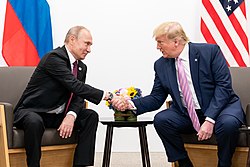| Trump–Russia relations |
|---|
 |
This is a list of timelines related to Donald Trump and Russian interference in United States elections that include investigations into links between Trump associates and Russian officials, as well as Russian interference in the 2016 elections that was "sweeping and systematic" and "violated U.S. criminal law". [1]
Contents
- Timelines
- Russian interference, 1977-2024
- Investigations, 2017-2021
- Related investigations
- See also
- References
The interactions continued throughout Trump's campaign and were identified by the FBI, Special counsel and several United States congressional committees in the course of their investigations into the Russian interference. [1] Several persons connected to the Trump campaign made false statements about those links and obstructed investigations. Timelines cover events during the campaign, all the way to election day on November 8, 2016.
Events and investigations also occurred during the presidential transition from November 9, 2016, to January 20, 2017, and continued through the first and second halves of 2017; the first and second halves of 2018, first and second halves of 2019, 2020, and 2021, largely as parts of the Crossfire Hurricane FBI investigation, the Special Counsel investigation, multiple ongoing criminal investigations by several State Attorneys General, and the investigation resulting in the Inspector General report on FBI and DOJ actions in the 2016 election.

